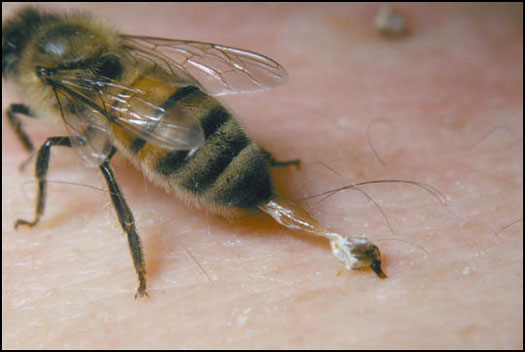 (photo courtesy of Healthline.com)
(photo courtesy of Healthline.com)
As a beekeeper, stings tend to come fairly often. One tries to handle the bees as carefully and gently as one can, but even the most precise handling can sometimes result in a sting. This weekend I got a particularly bad one and it got me thinking about the nature of bees and of being a beekeeper.
]]>I was inside of a broodless hive on Sunday and I had just attempted to requeen it the week before. I went though the hive frame by frame twice, checking to make sure there were no rogue queens milling about. None were found so we put the new marked queen’s cage in. I watched for a few moments while a couple of bees from the hive began feeding the attendants and queen contained in the cage. A good sign, but much can go wrong in the oncoming days during her release into the colony.
So I was in the hive looking around and literally the second frame I pulled from the top had an unmarked queen milling about on it. My heart sank. What was she doing in there? I felt confident that I had looked through each frame and that I had cut out any queen cells, but I clearly missed something.
After removing the empty queen cage and searching through the hive for the beautiful (and well-mated) queen, I was hit with the realization that they had killed her. I looked around on the ground, as sure enough I found her tiny body laid upon the rooftop as though she had flown out and landed there to rest.
.jpg)
Disappointed, I went back to the hive to close it back up and make a decision as to how to move forward. As I was moving the frames back in, a bee with something to say jetted out from between the frames and stung me under my upper arm. Her stinger got in deep and I could tell by the intensity and immediacy of the pain that she was probably quite old in bee terms. I’ve been told by more experienced beekeepers that the old bees have the more potent venom, and later in the season as the nectar flow ends their venom becomes more potent as well so that they may better defend their food stores. In any case, between the sensitive location and the venom it hurt like hell.
It was a different experience from when one accidentally grazes a bee stinger or gets stung a bunch when dumping 3 lbs. of bees from one box to another. This felt like a message. One that I got almost immediately. It wasn’t the intended message, to be clear. “Get the hell out of here!” was what the bee might have said if it was able to, but that one little bee is one small part of a significantly larger organism. What that organism as a whole was saying to me was, “Help us. Look at all of the signs we are showing you and act on them.”
I thought over the weekend (and even had a dream) about this one colony and I could do the following things:
– Place one or two frames of brood (capped and uncapped) from their strong sister colony in with them. This will help to build up their work force and if they need to rear another queen they can.
– Order a new queen and get it in there ASAP.
– If all else fails, combine with the stronger queen-right hive.
I am thinking that all of these options will come into play. I go back tomorrow to swap some frames with the stronger of the two hives to help boost their spirits and will likely order a new queen since I do not feel confident that these bees will mate well.
If all else fails, a combine is in order before Fall. It’s a bummer to see any of your colonies struggle, but it is what it is. I just want to help them.
Wish me luck!
<3 M
]]>
